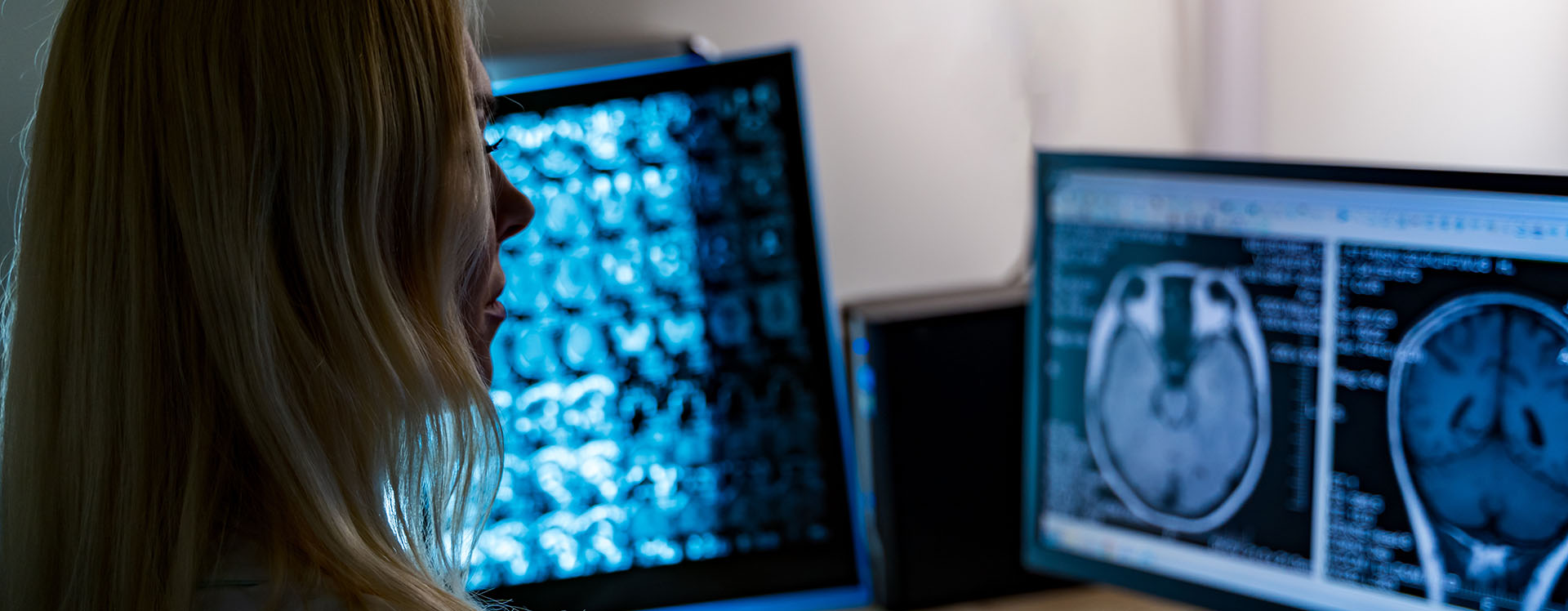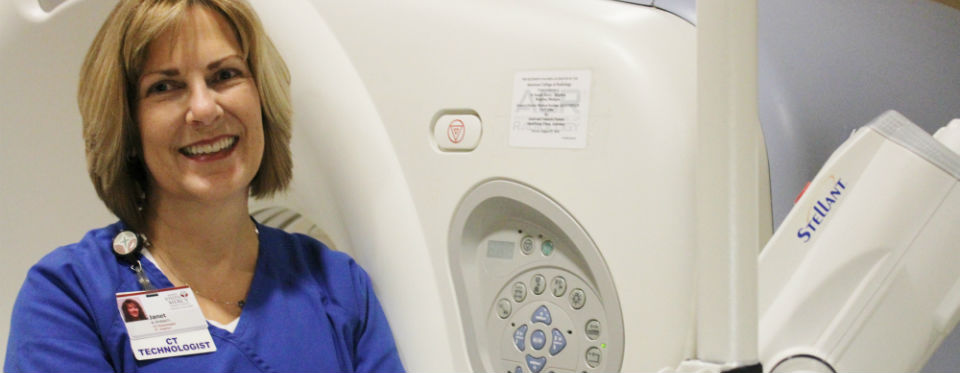Download a Free
UW Flexible Option Info Kit
Overview
Position yourself for the next step in your imaging career
An aging workforce, new technologies, and the growing demand for qualified health professionals may have you thinking about your next career move. Use your active registry to take another step in your healthcare career with the University of Wisconsin-Milwaukee Bachelor of Science in Biomedical Sciences: Diagnostic Imaging degree, offered online through the UW Flexible Option.
A bachelor’s degree in Diagnostic Imaging will prepare you to expand your career into other areas of medical imaging and health-related industries and assume a wide range of positions and leadership roles in hospitals and clinics, including quality-assurance manager, healthcare administrator, diagnostic imaging educator, or prepare for an advanced degree.
Offered in the self-paced, competency-based UW Flexible Option format, this degree completion program offers you the opportunity to build on your education and experience. You’ll develop and strengthen your skills in leadership, communication, problem-solving, critical thinking, and ethics—essential skills for success in healthcare and related professional settings.
What You’ll Learn
- How to integrate leadership, management, teaching and learning methods, and healthcare regulations into professional practice
- Effective communication skills as appropriate in given situations or encounters
- Integrative problem-solving, analytical and critical thinking skills
- How to demonstrate a commitment to professional growth ethical values, career development, scholarly activities, and contributions to the profession and post-baccalaureate education
- The breadth and depth of the university educational preparation, including understanding culturally diverse communities
Earn additional credentials
The UW-Milwaukee Diagnostic Imaging degree program is designed to allow you to earn additional credentials while earning your degree—like the Interprofessional Leadership in Healthcare Microcredential and Health Care Informatics Certificate.
Earning the Interprofessional Leadership in Healthcare Microcredential is as easy as completing two courses in the Diagnostic Imaging degree program and one elective. Upon completion of these courses, you’ll be awarded a digital badge that you can use anywhere to show your accomplishment and your interprofessional leadership skills, while still earning your degree. Interested in earning this microcredential, but not the degree? Learn more.
You can earn the Health Care Informatics certificate by completing three required Diagnostic Imaging courses and three Information Studies courses that make up the certificate. You’ll gain the skills and knowledge to understand, analyze, and evaluate the information used by successful healthcare organizations to provide patient care. In addition, this certificate can prepare you for a wide range of career options with hospitals, clinics, insurance companies, and pharmaceutical firms, as well as companies who design, develop, and implement health information systems. Interested in earning this certificate, but not the Diagnostic Imaging degree? Learn more.
Who Should Apply
Designed for experienced healthcare and imaging professionals who have one of the following active registries:
- ARDMS (American Registry for Diagnostic Medical Sonography)
- ARMRIT (American Registry of Magnetic Resonance Imaging Technologists)
- ARRT (American Registry of Radiologic Technologists)
- CCI (Cardiovascular Credentialing International) registry
Your active registry gives you a minimum of 60 advanced standing credits toward the 120 credits needed for completion. Upon admission to UWM and confirmation of your active registry, you will be awarded a minimum of 60 credits toward completion of your degree.
Don’t have an active registry, but still want a bachelor’s degree? Check out the Health Sciences degree.
Benefits of the UW Flexible Option
The UW Flexible Option is a national pioneer in competency-based education for adult learners. This means you can earn your degree without sacrificing your commitments to work and life. The competency-based, self-paced format of UW Flexible Option programs fits around your schedule, as you balance your responsibilities with your educational goals. In this program you’ll:
- Build on your active registry and the expertise you have developed on the job and in your previous experience or academic work.
- Fit school into your life. Start any month. Without semester schedules, group work, class discussions, or scheduled log-on requirements, you can earn your degree when it works for you.
- Control your pace. Complete assignments when you’re able and then move on to the next. Take a break when life gets busy.
- Earn an affordable degree. The Flex Tuition Guarantee locks in your tuition rate while you are actively enrolled in the program.
About UW-Milwaukee
The University of Wisconsin-Milwaukee College of Health Professions and Sciences offers a wide array of health-related academic programs in biomedical sciences, global health, health care administration, nursing, the rehabilitation sciences and sustainable peacebuilding.
The faculty and staff in these areas are training our graduates for high-demand careers. Many of our degree programs are nationally recognized and ranked and have achieved the highest accreditation possible.
Accreditation
University of Wisconsin-Milwaukee is accredited by the Higher Learning Commission of the North Central Association of Colleges & Schools.
Meet the UW-Milwaukee Faculty
Curriculum
This degree completion program requires a minimum of 120 credits. Upon admission to UWM and confirmation of your active registry, you will be awarded a minimum of 60 credits toward your degree.
The curriculum includes 39 required credits plus any general education requirements and elective credits for a 120 credit UW-Milwaukee bachelor’s degree.
UW-Milwaukee is a national leader in maximizing credit transfer. Your academic program requirements will depend on the number of credits you transfer in and previously completed courses which may meet general education or program requirements.
Lower Division Coursework
HS 102x—Healthcare Delivery in the United States
Introduces health care delivery focusing on consumers, providers, organization, financing, quality and utilization of services, health planning, and political and governmental impacts.
BMS 205x—Introduction to Diagnostic Medicine
Imparts knowledge and application of the mechanisms, procedures, physiological basis, decision-making, and evidence based protocols used to diagnose health and disease.
HCA 220x—Leading Healthcare Professionals
Explores effective healthcare leadership of self, others, and groups in complex healthcare settings. Emphasizes the leader understanding his or her own temperament and values in a healthcare context.
BMS 245x—Client Diversity in Health Sciences
Explores cultural self-awareness, rules, behaviors, and biases of diverse societies, as well as the interprofessional application of effective service delivery in the health professions to culturally diverse individuals and families (Required for Cultural Diversity general education requirement).
Upper Division Coursework
BMS 314x-Human Pathophysiology I
Study of human pathological processes. Emphasis on interrelationships among organ systems and deviations from homeostasis. Students will demonstrate a detailed knowledge of pathophysiology, including the etiology, pathogenesis, pathology, pathophysiology, clinical features, treatment and prognosis of commonly occurring diseases.
BMS 315x-Human Pathophysiology II
Continuation of Human Pathophysiology I. The overall focus of this course is the study of human pathological processes. Emphasis is on interrelationships among organ systems and deviations from homeostasis.
BMS 435x—Foundations of Interprofessional Education and Practice
Learning in this course is based on the IPEC Core Competencies for Interprofessional Collaborative Practice and principles of cultural engagement. You will engage more deeply with concepts addressed in previous coursework such as cultural diversity, communication, ethics, professionalism, and teamwork.
NURS 453x (or equivalent)—Information Management and Healthcare Technology
Introduces computer and information/decision science to support quality and safety in health care. Explore informatics issues and examine nursing’s role in healthcare technology. Opportunities to use and master various healthcare technologies and healthcare data will be given.
HS 311x—Law For Healthcare Professionals
Explores law and ethics as they relate to health care. Topics include ethical decisions, contracts, liability, malpractice, informed consent, HIPAA, litigation, healthcare technology, and trial proceedings.
DMI 458x—Seminar in Advanced Medical Imaging (formerly BMS 458)
Compares and contrasts normal and pathological anatomy cases combining ultrasound, computed tomography (CT), magnetic resonance imaging (MRI), and other technologies and their optimal clinical applications..
DMI 463x—Seminar in Education and Management in Medical Imaging (formerly BMS 463)
Explores problem solving techniques for management issues relating to diagnostic medical sonography, as well as educational strategies employed in ultrasound education.
DMI 496x —Professional Growth and Career Advancement in Diagnostic Imaging Professions (formerly BMS 496)
In this course learners will gain an appreciation for career growth and advancement opportunities through review and critique of their professional image and social media presence, opportunities for involvement as volunteers and leaders in professional associations, researching legislative, lobbying and advocacy efforts for imaging careers, reviewing the emerging trends in certification and recertification and efforts to create career pathways for mid-level providers (advanced practice). Knowledge of topics is achieved through review of past, current and trending efforts in all topics stated. Participants will display their understanding by responding to thought provoking assessment that requires researching literature and available media sites devoted to the latest information on career growth and advancements of imaging professionals.
Earn a microcredential before you complete your degree
Take three courses to earn the Interprofessional Leadership in Healthcare microcredential. You’ll be awarded a digital badge that signifies to employers you have the knowledge and skills needed to lead interprofessional teams. Current students can check with your Success Coach to learn more about your progress. Required microcredential courses include:
- BMS 433 Teamwork in the Health Professions
- DMI 496 Professional Growth and Career Advancement in Diagnostic Imaging Professions
- BMS 435 Foundations for Interprofessional Education and Practice
Choose your electives to earn a certificate with your degree
The Health Care Informatics certificate features 18 credits (6 courses) and can be completed while you earn your Diagnostic Imaging bachelor’s degree. Nine credits are included in the diagnostic imaging curriculum. You will learn fundamental skills in medical terminology, database technology, and data management in this multidisciplinary certificate offered collaboratively through the UW-Milwaukee College of Health Professions and Sciences, School of Information Studies, and School of Nursing. Current students, check with your Success Coach to learn more about your progress. Required certificate courses include:
- INFOST 110 Essentials of Information Science and Technology
- BMS 205 Introduction to Diagnostic Medicine
- HS 311 Law and Ethics for Healthcare Professionals
- INFOST 340 Introduction to Systems Analysis
- INFOST 379 Data Analysis & Visualization for the Information Professional
- NURS 453 Information Management and Healthcare Technology
Tuition

The UW Flexible Option offers working adults – like you – a more affordable way to finish a degree. Your coursework takes place in subscription periods – rather than semesters. These subscription periods start every single month, and are approximately 12 weeks long.
Instead of paying based on your course or credit load, you choose between two flat rate tuition plans. Our unique subscription period structure and flat-rate tuition model means you are in control of both your schedule and your cost.
Financial Aid and the Aspire Scholarship are available for this program. We also encourage speaking with your employer about workplace tuition assistance.
- All-You-Can-Learn Option: Choosing this option allows you to enroll in as many courses as you have time for within the subscription period for a flat tuition rate of $2,250. You can add additional courses in your subscription period if you finish others early.
- Single Course Option: You may also decide you would like to focus on just one course at a time. The tuition for this option is $1,125. In this option, you are not eligible to add additional courses during your subscription period if you finish the first one early. In this case, you must wait until your next subscription period to add additional courses.
| Subscription Option | Courses you can take | Tuition |
| All-You-Can-Learn | 2 or more | $2,250 |
| Single Option | 1 | $1,125 |
You can switch back and forth between these tuition options with each new subscription period. For example, perhaps over the summer you do the Single Course option because your family is home on summer break, but once the kids go back to school in the fall you switch to the All-You-Can-Learn option.
Are there any additional fees?
There are no segregated fees with this program, which saves you hundreds of dollars per credit hour. However, your tuition does not include the cost of textbooks or other special materials that may be required for individual courses.
Admission
Finishing your degree is closer than you think! Schedule an advising call at 608-800-6762 or contact us at flex@uwex.wisconsin.edu.
Minimum Academic Requirements
Candidates for the Bachelor of Science in Biomedical Sciences Diagnostic Imaging degree must have an Associate Degree in a related field (e.g. diagnostic imaging, medical sonography, radiography) OR a hospital-based diagnostic imaging training program. You must also have an electronic copy of an active ARRT, ARMRIT, ARDMS, or CCI registry card.
- Note to students applying to the Diagnostic Imaging program – It is not necessary for graduates of a hospital-based training program to acquire a transcript for admission. For associate-degree holders, transcripts are still needed for transfer-credit assessment.
Transfer credit will be awarded from degree-granting colleges or universities with institutional accreditation from an accrediting organization recognized by the Council for Higher Education Accreditation (CHEA). Non-CHEA approved institutional accreditors recognized by the Department of Education will be considered on a case-by-case basis and transfer credit allowed if appropriate based on the quality, comparability, and applicability of the coursework. Schools with programmatic accreditation may be evaluated for transfer if the accreditor is recognized by CHEA and the relevant coursework falls within the accreditor’s area of specialization.
How to Apply
- You may apply up to five months in advance of your desired start date. See Steps to Apply.
- If previously enrolled in Flex, please review our returning student admissions process.
Transfer Credit Evaluations
- Transfer credit is awarded for college-level coursework completed at regionally accredited institutions. See Transfer Credit Evaluations for more information.
- Learn more about how credit by exam and military coursework may apply towards your degree.
Still have questions? Check out our Admission FAQ page.






